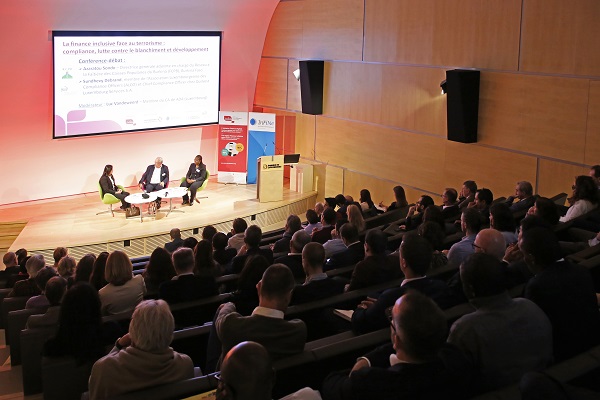 Midi de la microfinance 10 Oct 2018;
Credit: O Minaire, ADA
Midi de la microfinance 10 Oct 2018;
Credit: O Minaire, ADA
On Wednesday 10 October 2018, the theme of the Midi de la Microfinance lunch attracted a lot of interest, as witnessed by many questions from professionals in the financial sector present in the auditorium of the Bank of Luxembourg, where nearly 100 people attended the debate on inclusive finance against terrorism, between the leader of the largest microfinance institution in Burkina Faso and one of 900 members of the Association Luxembourg Compliance Officer (ALCO).
Luxembourg heavily regulated for sending funds
"Customers, investors, people with whom we have a business relationship ... we must know who we work with before we can make transactions." For example, Sundhevy Debrand, ALCO member and Compliance Officer at Quilvest Luxembourg Services S.A investment bank, provided context. The sending of funds from Luxembourg to different countries is heavily regulated by European anti-money laundering directives transposed in Luxembourg, which also include the list of high-risk countries classified by the Financial Action Task Force (FATF), an Intergovernmental Committee against Money Laundering and the Financing of Terrorism. Mrs Debrand continued "Facing this list, the Luxembourg government has not taken a stand; it is up to each financial sector professional to make their own risk-based approach, based on their own knowledge of the legal and regulatory framework of the country with which they will work. But we know that in finance, zero risk does not exist. It is however possible to reduce the risk after two or three years of work with a country, when one knows well its local specificities. Our role as compliance officer is to control the sending of funds to these countries, but this control comes first through the knowledge of the customer."
Regulations applicable in the field, but at what price?
"How are these regulations perceived on the side of Burkina?" asked Luc Vandeweerd, moderator of the debate, by addressing Azaratou Sondo, deputy director in charge of the Network at the Faissière des Caisses Populaires du Burkina (FCPB). "Since the creation of our company in 1972 until today, regulations have undergone a great evolution. We are now subject to instructions from the Central Bank and it is becoming increasingly difficult to make large volume transactions. We have an obligation to declare any transaction above 5 million CFA Francs - approximately €7,600. This permanent control can destabilise the customer and even damage our reputation."
While the restrictive aspect of compliance is underlined in administrative terms, its cost does not facilitate its implementation either. "The cost of compliance is expensive," says Debrand. So who does it belong to? "A field visit is at the expense of the institution and can quickly reach large sums depending on the cost of inspection and the financial penalties applied, if any," Ms. Debrand continued. "Personally, we are forced to do with", replied Azaratou Sondo. "Bearing the cost of compliance involves putting in place structures to absorb these costs, because we can not charge this to our members."
Digital finance as an alternative to terrorism
In the face of terrorism in north-eastern Burkina, insecurity reigns and loan officers can not even move to villages to meet with members. So how can we continue to offer services in these fragile areas? "The solution is digital finance," said Sondo. "A national strategy is being developed to allow us to transfer money securely, while continuing our mission to eradicate poverty. I have good hope".
Strengthen North-South cooperation and dialogue
The last word was given to Raymond Schadeck, President of Investing for Development SICAV, a microfinance investment fund based in Luxembourg. If for him the respect of the European and Luxembourgish legislations is very important, it does not solve obviously all the problems on the ground. "You have to make a good assessment between the risk and what you want to achieve," he added. "Above all, we need to surround ourselves with partners who know the market well and who have the means to do the job. LMDF has been operating with ADA for 9 years. Together they created 115 partnerships in 26 countries. It is through a strong partnership that we will not succeed in avoiding the problem, but at least in preventing it."
According to Mr Schadeck, microfinance institutions need to invest even more money, to better inform the public and their investors about the impact they create. "Talking about risk is important; but we must counterbalance all that; in 9 years, LMDF has disbursed 150,000 loans, that is, they have changed the lives of 150,000 homes!".








